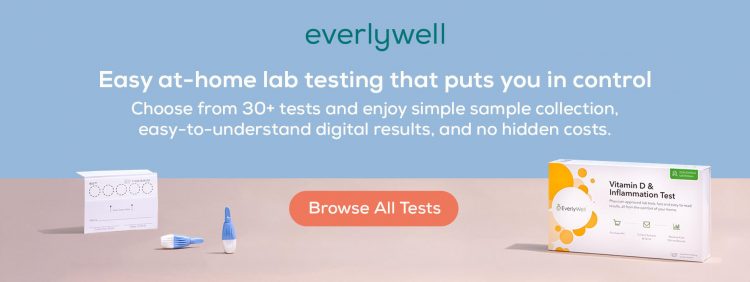Medically reviewed by Neka Miller, PhD on August 15, 2021. To give you technically accurate, evidence-based information, content published on the Everlywell blog is reviewed by credentialed professionals with expertise in medical and bioscience fields.
Table of contents
When most people think about their metabolism, they sometimes ask questions like “Does coffee boost your metabolism”? or “At what age does your metabolism slow down?” People also think about burning fat and losing weight. While that’s part of the story, metabolism is more involved and complex than that. Broadly, metabolism encompasses all the processes involved with turning everything you eat and drink into energy.
If you think that your metabolism is a little off, you can undergo metabolic testing. This can provide insight into your overall health and help you take the next steps to support your metabolism. Learn more about metabolic testing below.
Check in on 3 key hormones that influence metabolism with the Everlywell at-home Metabolism Test.
Metabolic testing involves evaluating a person’s metabolic rate at which they burn calories as energy and use oxygen. This is distinct from at-home metabolism tests (like the Everlywell test) which measure hormones related to metabolic functioning in the body.
Types of Metabolic Tests
Metabolic testing comes in a few different forms, each of which measures different components of a person’s metabolic rate.
Resting Metabolic Rate (RMR) Test
Most forms of metabolic testing start with RMR testing, also known as basal metabolic rate testing. Even if you don’t realize it, you are constantly expending calories. From blinking to breathing to pumping blood, your body needs energy to perform every single function, big or small.
The rate of calories that your body burns to perform all these functions is the basal or resting metabolic rate. That’s exactly what an RMR test measures, giving you a fairly accurate estimate of the calories you burn when you’re at rest.
Maximum Volume of Oxygen (VO2) Test
A VO2 max test, also known as the anaerobic capacity test, measures the amount of oxygen that you use when exercising. The V02 test can help you understand when and how your body uses oxygen based on the intensity level of a given physical activity and can help estimate the number of calories that you use when exercising. The V02 max test often involves a special mask and a treadmill, so it typically isn’t available at home or even in some doctors’ offices.
Lactate Threshold Test
As you exercise, your muscles produce lactic acid. This creates the characteristic burn of a workout and eventual muscle mass fatigue, signaling to you that you should take a rest (or you risk overworking your muscles).
The lactate threshold refers to the point when you have too much lactic acid buildup in your muscle mass. The lactate threshold test result can essentially measure when that happens and the intensity levels that your body and muscles can actually withstand before hitting that point of fatigue.
This test is typically reserved for professional athletes. It involves running on a treadmill or riding a stationary bike and getting your blood drawn at different points as the physical activity increases.
At-home tests, like the Everlywell Metabolism Test, measure the levels of certain metabolic hormones that influence your metabolism. The Everlywell test looks at cortisol, free testosterone, and thyroid-stimulating hormone (TSH) levels.
Note that this is different from a typical metabolic rate test. At-home metabolism tests are hormone tests that don’t measure your metabolic rate or look at how your body uses calories. Still, these tests can help one understand if their metabolism is properly supported with the right hormone levels, which may help guide potential weight loss or gain strategies.
Understanding your metabolism is a great way to stay in tune with your health and develop a healthier relationship with both food and exercise. To that end, metabolism tests of various kinds can give you the key to learning more about your own body.
How your hormones affect your metabolism
Why Understanding Your Metabolism Is A Key To Better Health
What is metabolism and how does it work? Key points to know
References
1. Basic Metabolic Panel, Serum. Mayo Clinical Laboratories. URL. Accessed August 15, 2021.
2. Comprehensive Metabolic Panel (CMP). MedlinePlus. URL. Accessed August 15, 2021.
Source by www.everlywell.com


